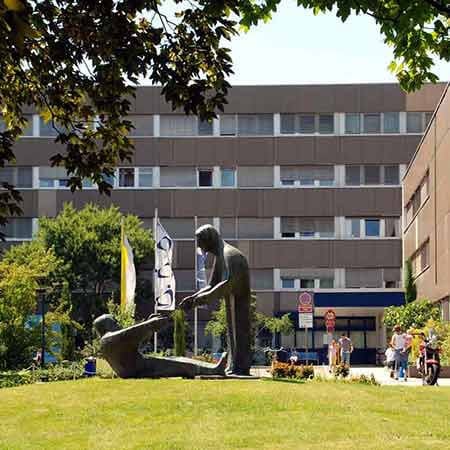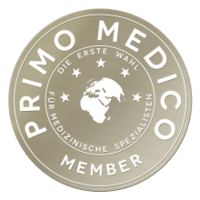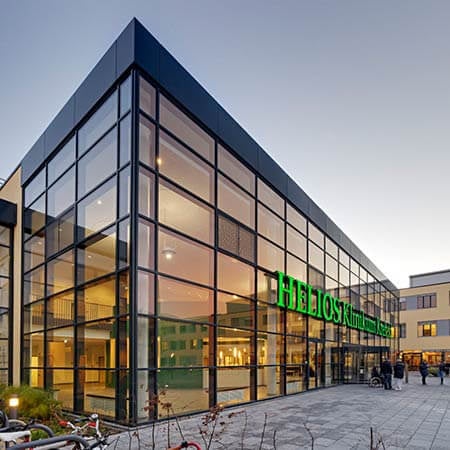Hospitals for Chemotherapy in Germany
Each hospital in this list meets Booking Health’s strict international standards: at least 250 surgeries per year, ISO‑certified quality management, and documented survival outcomes. Our medical board then ranks the clinics by clinical expertise, technology, and patient‑satisfaction scores.

According to the reputable Focus magazine, the Helios Hospital Berlin-Buch ranks among the top medical facilities in Germany! The clinic is proud of its rich history, which dates back over 100 years, as well as the status of a maximum care medical center with exceptionally high success treatment rates. The medical institution is

Chemotherapy in gastrointestinal carcinoid tumors
Price from:
8003.44
Go to the program Chemotherapy in neuroendocrine tumors (NETs)
Price from:
8110.98
Go to the program Treatment of appendix cancer with chemotherapy
Price from:
7697.55
Go to the program Chemotherapy for germ cell tumors of the ovary (dysgerminoma) (1 course)
Price from:
6570.03
Go to the program Chemotherapy for thyroid cancer (1 course)
Price from:
7408.36
Go to the program Chemotherapy of choriocarcinoma (1 course)
Price from:
6641.02
Go to the program Chemotherapy of clear cell renal carcinoma 1 course
Price from:
12342.68
Go to the program Chemotherapy of nephroblastoma (Wilms tumor) (1 course)
Price from:
12229.92
Go to the program Chemotherapy of osteosarcoma (bone cancer) (1 course)
Price from:
13279.14
Go to the program Chemotherapy of ovarian yolk sac tumor (1 course)
Price from:
7371.82
Go to the program Chemotherapy of polyembryoma ovarian (1 course)
Price from:
6644.16
Go to the program Chemotherapy of retinoblastoma (1 course)
Price from:
4698.74
Go to the program Chemotherapy of teratoma with Cisplatin (1 course)
Price from:
6533.49
Go to the program Chemotherapy of testicular embryonal carcinoma (1 course)
Price from:
6632.67
Go to the program Chemotherapy of testicular seminoma (1 course)
Price from:
6720.37
Go to the program Chemotherapy of testicular yolk sac tumor (1 course)
Price from:
7435.51
Go to the program Treatment of neuroendocrine tumor (NET) of the appendix with chemotherapy
Price from:
8047.29
Go to the program Treatment of neuroendocrine tumor (NET) of the colon with chemotherapy
Price from:
8032.68
Go to the program Treatment of neuroendocrine tumor (NET) of the lung with chemotherapy
Price from:
7984.65
Go to the program Treatment of neuroendocrine tumor (NET) of the pancreas with chemotherapy
Price from:
8062.95
Go to the program Treatment of neuroendocrine tumor (NET) of the stomach with chemotherapy
Price from:
7977.34
Go to the program Treatment of ureteral cancer with chemotherapy
Price from:
6542.89
Go to the program 
The ViDia Hospital Karlsruhe is a modern medical facility with a rich history and traditions. The medical complex is an academic hospital of the University of Freiburg, granting patients access to advanced university medicine and the very latest therapeutic developments. The hospital first opened its doors in 1851 and, since the



Chemotherapy in gastrointestinal carcinoid tumors
Price from:
7533.64
Go to the program Chemotherapy in neuroendocrine tumors (NETs)
Price from:
7664.14
Go to the program Treatment of appendix cancer with chemotherapy
Price from:
7448.04
Go to the program Chemotherapy for germ cell tumors of the ovary (dysgerminoma) (1 course)
Price from:
Go to the program
7047.88
6447.88 Chemotherapy for thyroid cancer (1 course)
Price from:
Go to the program
7930.66
7130.66 Chemotherapy of choriocarcinoma (1 course)
Price from:
Go to the program
6991.51
6391.51 Chemotherapy of clear cell renal carcinoma 1 course
Price from:
Go to the program
13148.7
11868.7 Chemotherapy of nephroblastoma (Wilms tumor) (1 course)
Price from:
Go to the program
12817.75
11537.75 Chemotherapy of osteosarcoma (bone cancer) (1 course)
Price from:
Go to the program
14031.15
12591.15 Chemotherapy of ovarian yolk sac tumor (1 course)
Price from:
Go to the program
7862.47
7102.47 Chemotherapy of polyembryoma ovarian (1 course)
Price from:
Go to the program
6956.01
6356.01 Chemotherapy of retinoblastoma (1 course)
Price from:
0.00
Go to the program Chemotherapy of teratoma with Cisplatin (1 course)
Price from:
Go to the program
6926.78
6326.78 Chemotherapy of testicular embryonal carcinoma (1 course)
Price from:
Go to the program
6880.84
6280.84 Chemotherapy of testicular seminoma (1 course)
Price from:
Go to the program
7033.27
6433.27 Chemotherapy of testicular yolk sac tumor (1 course)
Price from:
Go to the program
7905.28
7145.28 Diagnosis and chemotherapy of T-cell lymphoma
Price from:
11816.65
Go to the program Treatment of neuroendocrine tumor (NET) of the appendix with chemotherapy
Price from:
7534.69
Go to the program Treatment of neuroendocrine tumor (NET) of the colon with chemotherapy
Price from:
7529.47
Go to the program Treatment of neuroendocrine tumor (NET) of the lung with chemotherapy
Price from:
7702.77
Go to the program Treatment of neuroendocrine tumor (NET) of the pancreas with chemotherapy
Price from:
7529.47
Go to the program Treatment of neuroendocrine tumor (NET) of the stomach with chemotherapy
Price from:
7682.94
Go to the program Treatment of ureteral cancer with chemotherapy
Price from:
Go to the program
6881.78
6421.78 
Founded in 2014, the HELIOS Clinic Krefeld is one of the most modern medical facilities in Germany today. A team of highly qualified specialists, innovative medical equipment and comfortable accommodation conditions – the clinic has everything to make the treatment run smoothly and efficiently. Having crossed the threshold
Chemotherapy in gastrointestinal carcinoid tumors
Price from:
7646.4
Go to the program Chemotherapy in neuroendocrine tumors (NETs)
Price from:
7693.38
Go to the program Treatment of appendix cancer with chemotherapy
Price from:
7393.75
Go to the program Chemotherapy for germ cell tumors of the ovary (dysgerminoma) (1 course)
Price from:
6430.14
Go to the program Chemotherapy for thyroid cancer (1 course)
Price from:
7081.59
Go to the program Chemotherapy of choriocarcinoma (1 course)
Price from:
6457.28
Go to the program Chemotherapy of clear cell renal carcinoma 1 course
Price from:
11759.08
Go to the program Chemotherapy of nephroblastoma (Wilms tumor) (1 course)
Price from:
11511.65
Go to the program Chemotherapy of osteosarcoma (bone cancer) (1 course)
Price from:
12265.42
Go to the program Chemotherapy of ovarian yolk sac tumor (1 course)
Price from:
7004.34
Go to the program Chemotherapy of polyembryoma ovarian (1 course)
Price from:
6444.75
Go to the program Chemotherapy of retinoblastoma (1 course)
Price from:
0.00
Go to the program Chemotherapy of teratoma with Cisplatin (1 course)
Price from:
6246.39
Go to the program Chemotherapy of testicular embryonal carcinoma (1 course)
Price from:
6277.71
Go to the program Chemotherapy of testicular seminoma (1 course)
Price from:
6439.53
Go to the program Chemotherapy of testicular yolk sac tumor (1 course)
Price from:
7071.15
Go to the program Diagnosis and chemotherapy of T-cell lymphoma
Price from:
11619.34
Go to the program Treatment of neuroendocrine tumor (NET) of the appendix with chemotherapy
Price from:
7666.23
Go to the program Treatment of neuroendocrine tumor (NET) of the colon with chemotherapy
Price from:
7579.58
Go to the program Treatment of neuroendocrine tumor (NET) of the lung with chemotherapy
Price from:
7507.54
Go to the program Treatment of neuroendocrine tumor (NET) of the pancreas with chemotherapy
Price from:
7709.04
Go to the program Treatment of neuroendocrine tumor (NET) of the stomach with chemotherapy
Price from:
7674.58
Go to the program Treatment of ureteral cancer with chemotherapy
Price from:
6451.02
Go to the program 

